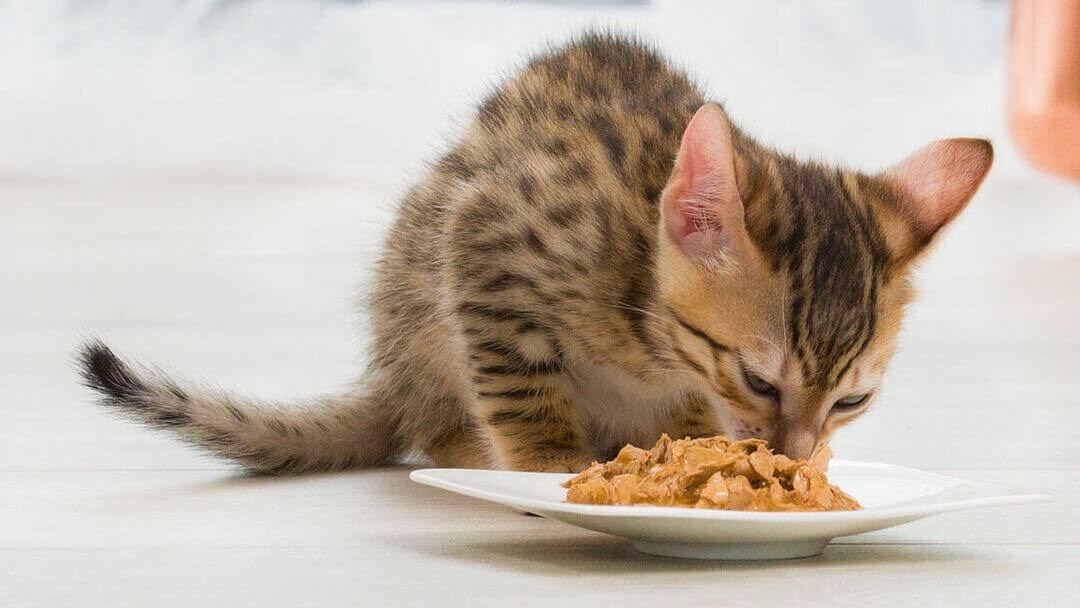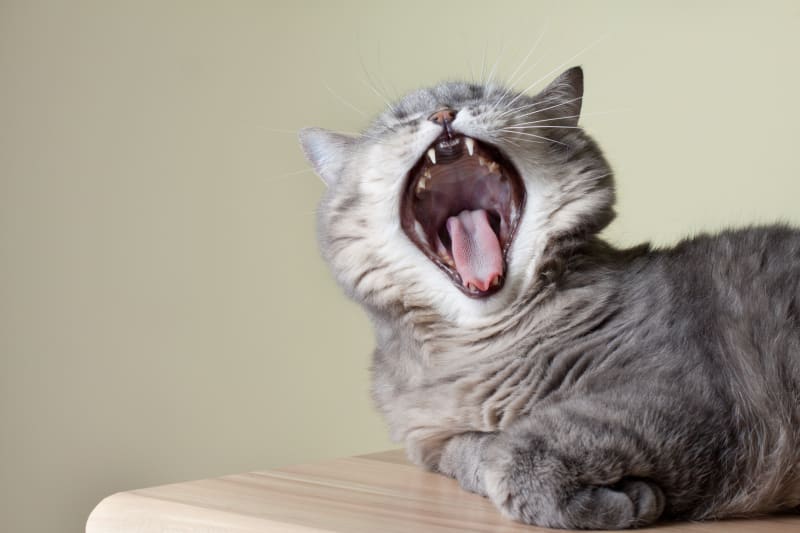Kitten teething is a natural process where kittens develop and replace their baby teeth with adult teeth. During this time, kittens may experience discomfort and exhibit behaviors like chewing on objects or biting.
It is important to provide appropriate toys, teething treats, and regular dental care to help ease their discomfort and support healthy teething. Ensure the toys are safe, durable, and specifically designed for teething kittens. In addition, schedule regular veterinarian check-ups to monitor their dental health.
By taking these proactive measures, you can help your kitten navigate through the teething stage with minimal discomfort and promote healthy oral development.
Common Signs Of Kitten Teething
Kittens go through a teething phase, just like human babies. Tender gums are a common sign of kitten teething. You may notice your kitten trying to alleviate discomfort by chewing on various objects. This chewing behavior is a natural response to the teething process. To ease the pain, kittens may also experience increased drooling.
During this time, it’s important to provide appropriate toys and objects for your kitten to chew on. This can help relieve their discomfort and prevent them from damaging valuable items around the house. Soft rubber toys, teething rings, and specially designed kitten chew toys are ideal choices.
Remember to keep an eye on your kitten’s chewing habits and provide proper dental care. Regular veterinary check-ups and dental cleanings can help ensure healthy teeth and gums for your furry friend!
When Does Kitten Teething Start And End?
Kittens typically start teething at around 3 to 4 months of age. This is when their baby teeth, or milk teeth, begin to fall out and make way for their adult teeth. The teething process involves the growth of their adult teeth, which usually starts at the front of the mouth. As the adult teeth push through the gums, the baby teeth will start to loosen and fall out gradually.
Teething can be a discomforting time for kittens, as their gums may become swollen and sore. It’s important to provide them with suitable teething toys and chews to help alleviate their discomfort and prevent them from chewing on inappropriate items. The duration of the teething process varies for each kitten, but generally, it takes a few months for all the baby teeth to be replaced by the permanent adult teeth.
| Teething timeline | Growth of adult teeth | Duration of teething process |
|---|---|---|
| 3 to 4 months | Starts at front of mouth | Varies, but generally a few months |
Providing Appropriate Chewing Options
Kittens go through a teething phase, just like human babies. It’s important to provide them with appropriate chewing options to help relieve their discomfort and prevent damage to your belongings. Safe chew toys are a great option for kittens to chew on. Look for toys made of durable materials that can withstand chewing without breaking into small pieces. Additionally, you can provide natural teething remedies such as frozen carrots or a clean, damp washcloth for your kitten to chew on. Supervised playtime is crucial during this phase to ensure that your kitten doesn’t chew on anything unsafe. Keep an eye on your kitten and redirect their chewing behavior to appropriate toys. By providing appropriate chewing options and supervising playtime, you can help your kitten through their teething phase and protect your belongings from damage.
Optimal Diet For Teething Kittens
When kittens start teething, it becomes crucial to provide them with an optimal diet that supports their dental health and overall well-being. Soft food options are often recommended during this phase to alleviate discomfort and reduce the risk of dental issues caused by chewing hard kibble. Wet food is a great choice for teething kittens as it is easier to eat and gentler on their tender gums. The soft and moist texture of wet food allows them to chew and swallow without much difficulty. Additionally, having a consistent meal consistency is important for teething kittens, as it helps them establish a routine and ensures they receive adequate nutrition. Whether you choose wet or dry food, it is essential to select products specifically formulated for kittens to ensure their dietary needs are met during this crucial stage.
Dental Care For Teething Kittens
Teething is a natural and important process for kittens. It is essential to ensure their dental health during this stage. One effective technique is introducing brushing early on. Start by gradually introducing the toothbrush to your kitten. Use a soft-bristled toothbrush and a specially formulated kitten-friendly toothpaste to get them familiar with the sensation.
Additionally, providing chew sticks can help satisfy their natural chewing instinct and promote dental health. Opt for kitten-safe chew sticks that are designed to soothe their gums and promote healthy teeth growth.
Regular check-ups with a veterinarian are vital for monitoring your kitten’s dental development. The veterinarian can assess the growth of new teeth and address any potential issues early on. They can also offer professional cleaning to remove tartar build-up and provide guidance on maintaining dental hygiene at home.
Alleviating Teething Discomfort
Teething can be a challenging experience for both kittens and their owners. Luckily, there are several ways to alleviate teething discomfort and help your furry friend through this phase. One effective method is to use cold compresses. Simply wrap a clean cloth or towel in the freezer for a few minutes, then gently press it against your kitten’s gums to provide relief. Another helpful technique is to give gentle gum massages. Using your clean finger, apply light pressure in circular motions on your kitten’s gums. This can help soothe the pain and stimulate blood flow to the area. Additionally, there are pain relief options available specifically designed for teething kittens. Consult with your veterinarian to find the best and safest product for your furry friend. By implementing these techniques, you can ensure a smoother teething experience for your kitten.
Potential Complications During Teething
Kitten teething can sometimes lead to potential complications. It’s important to be aware of these issues, such as pain, excessive drooling, and loss of appetite, and to provide appropriate care for your furry friend during this stage.
Retained Deciduous Teeth
During the teething process, it is not uncommon for kittens to have some of their deciduous (baby) teeth become retained. This occurs when the permanent teeth start to emerge, but the baby teeth do not fall out as they should. Retained deciduous teeth can cause overcrowding and misalignment issues, leading to further dental problems in the future. It is essential to have these retained teeth removed by a veterinarian to avoid complications.
Gum Infections
Kittens may experience gum infections during the teething phase. The discomfort and inflammation caused by teething can make the gums more susceptible to infections. Gum infections can lead to pain, swelling, and even difficulty eating for the kitten. Regular oral hygiene practices, such as gentle brushing and using kitten-friendly dental products, can help prevent gum infections and promote overall dental health.
Improper Tooth Alignment
Teething can sometimes result in improper tooth alignment in kittens. As the permanent teeth erupt, they can be misaligned due to various factors, such as retained deciduous teeth or genetic predisposition. Improper tooth alignment may cause difficulties in chewing, affect the kitten’s bite, and potentially lead to further dental issues. Regular dental check-ups and early detection of misalignments can help address and manage these problems effectively.
Importance Of Professional Dental Care
One crucial aspect of kitten teething is ensuring professional dental care. Discussing with a veterinarian is essential to understand how to maintain your kitten’s oral health. They can provide valuable insights into dental cleaning procedures and practices. Regular dental cleanings, typically performed by professionals, are essential to remove tartar and plaque build-up that can lead to gum disease and tooth decay. Additionally, veterinarians can educate you on dental health prevention, including proper toothbrushing technique, suitable dental products, and appropriate diets for promoting healthy teeth and gums.
By seeking professional dental care for your kitten, you can prevent potential dental issues and ensure their overall well-being. Remember, the early stages of a kitten’s life are crucial for long-term dental health, so don’t hesitate to consult a veterinarian and implement necessary dental care practices.

Credit: www.purina-arabia.com
Conclusion
Helping your kitten navigate through the teething process is essential for their overall health and comfort. By providing appropriate chew toys, proper dental care, and keeping a close eye on their behavior, you can ensure a smooth and pain-free teething experience for your furry friend.
Remember to be patient and understanding during this time, as it is a natural and necessary part of their growth. Happy teething!


